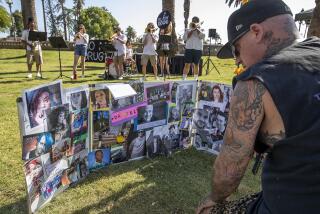Work on Anti-Cancer Agents Moving Slowly
Preliminary attempts to use specially engineered antibodies to attack cancer in humans offer some hope for the future but appear so far to have had little impact on the disease, researchers reported Friday at a conference in San Diego.
Reporting on early tests with so-called monoclonal antibodies, several researchers said they had succeeded in using the antibodies to carry cancer drugs and toxins directly to tumor cells but that they had seen little effect on the patients.
“There are surely no breakthroughs here,” Dr. Carl Pinsky, chief of the biological resources branch of the National Cancer Institute, observed in a brief interview. “This is a very early form of therapy.”
“What we’re going to see is a back-and-forth, trying some things, some of them not working,” said Dr. Robert Dillman of the UC San Diego Cancer Center, which sponsored the conference. “I think that the key is that (these antibodies) do offer some potential, but we’re a long way off.”
Monoclonal antibodies are highly selective proteins that can attach themselves to specific targets, such as cancer cells. Linked to radioactive isotopes, drugs or toxins, they might, proponents hope, act as “guided missiles” delivering lethal blows directly to cancer cells.
The approach has attracted considerable interest. Some researchers believe it could allow them to increase the therapeutic dose delivered to cancer cells, combine therapies such as isotopes with toxins, and reduce the often grueling side effects of cancer treatment.
Among those addressing the conference of several hundred scientists and representatives of business and government was Dr. Robert Oldham, whose Tennessee-based firm, Biotherapeutics Inc., is offering the experimental treatment to patients willing to pay as much as $35,000.
Presenting unpublished results from 15 patients who had not responded to traditional cancer treatment, Oldham said biopsies showed the antibodies had reached their targets--”a striking demonstration of selectivity of antibody ‘cocktails’ in humans in clinical trials.”
While several patients showed minor improvements, Oldham said, “in the other patients we did not see major clinical effects.” Asked whether his treatment had ever sent the disease into complete remission, Oldham answered simply, “No.”
Also presenting findings was Dr. Richard Timms, director of chest and critical care medicine at Scripps Clinic and Research Foundation. Timms and several others have treated 11 patients with advanced forms of lung cancer.
Whereas Oldham reported that his patients displayed few side effects, even when receiving doses of the magnitude that would provoke reactions in traditional treatment, Timms reported “significant reactions” that for several days left patients “relatively miserable.”
Timms said that although his antibodies, too, appeared to have reached their target, X-rays and scans showed few changes in the patients’ tumors. All but one of the patients has since died.
Several researchers predicted that future efforts in the field will center on so-called cocktails of multiple antibodies and multiple toxic agents in hopes of addressing the different types of tumors even in a single patient.
Oldham called it “a combination of multiple antibodies carrying multiple warheads.”
The three-day conference, held at the Hotel Inter-Continental, was to conclude today.






